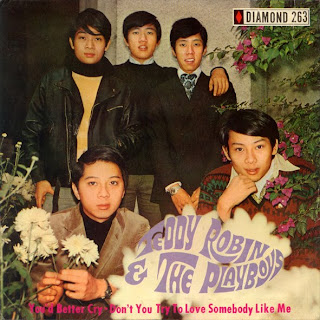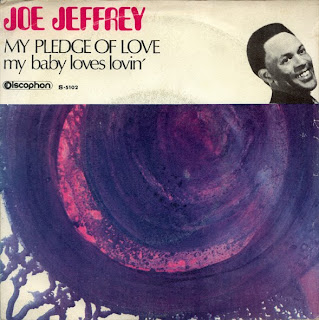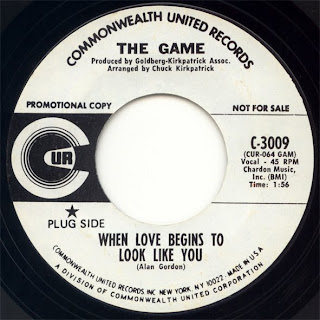
Funky Kings - Help To Guide Me (Richard Stekol) del LP Arista AL 4078 - 1976
Otra canción especial, perdida en otro LP perdido, en un blog perdido de un perdido. Una canción nocturna, aparentemente discreta, tierna, humeante, y con un encantador ritmo de tiempo medio. Sonido clásico americano de los 70. Un bala perdida que admite estar cansado de rodar solo, pero que no sabe muy bien cómo salir de ello.
Funky Kings, nombre tal vez poco apropiado, editaron un solitario LP, aunque llegaron a grabar un segundo, que nunca fué publicado, dadas las ventas del primero. Los tres motores del grupo, posteriormente, siguieron en el tenebroso mundo de la música:
Jack Tempchin, con varios discos desde 1978, el más reciente en 2007, amén de colaboraciones varias con Tom Waits, The Eagles, Glen Frey, Glen Campbell, Tom Rush...
El autor de este pequeño flash de neón, Richard Stekol, que antes de Funky Kings ya había publicado dos LPs con su anterior grupo, Honk (1973 - 1974), siguió en ello y en ello sigue actualmente vendiendo sus discos en su propia web.
Y el tal vez más conocido de los tres, Jules Shear, tuvo un cierto éxito con su grupo Jules & The Polar Bears, entre 1978 y 1980. Desde entonces ha seguido editando discos intermitentemente. Sus canciones han sido grabadas, algunas con éxito, por Cindy Lauper, Art Garfunkel, The Bangles, Iain Matthews, Roger McGuinn... También trabajó, entre otros, con Matthew Sweet.
"Help To Guide Me", el cálido sonido de una luciérnaga urbana.
-----------------------------------------------------------------------
Another special song, lost in another lost LP, on a lost blog from a lost one. A nocturnal song, apparently discreet, tender, smokey, and with a charming midtempo rhythm. Clasical american 70s sound. A stray and easy living guy who admits being tired of rolling alone, but who doesn't really know how to get out of it.
Funky Kings, probably an unfortunate name, released a lone LP, though they recorded a second one which was never released given the low sales of the first one. The three main forces of the band kept on the gloomy world of music:
Jack Tempchin, with several solo records since 1978, last one in 2007, and also some side jobs with Tom Waits, The Eagles, Glen Frey, Glen Campbell, Tom Rush...
The writer of this little neon flash, Richard Stekol, who before Funky Kings had already released a couple of albums with his former band, Honk (1973 - 1974), kept on it and still does, selling his albums on his own website.
And probably the better known of them, Jules Shear, had a certain success with his own band Jules & The Polar Bears, between 1978 - 1980. He has been releasing, since then and intermittently, some solo albums. His songs have been recorded, some with success, by Cindy Lauper, Art Garfunkel, The Bangles, Iain Matthews, Roger McGuinn... He also worked, among others, with Matthew Sweet.
"Help To Guide Me", the warm sound of a urban firefly.
Help To Guide Me
I need your help to guide me
After all these years of living alone
I need your help inside me
Won't you take this wanderin' boy back home
Well, there's a ring around the moon tonight
And everything is still
And your lingering love's a drivin' lullaby
Oh baby
It's speaking right into my heart
Across my windowsill
And I can't run and it won't let me hide
Cause I need your help to guide me
After all these years of living alone
I need your help inside me
Won't you take this wanderin' boy back home
(Richard Stekol)
http://rapidshare.com/files/430241005/Funky_Kings_-_Help_To_Guide_Me.mp3
Otra canción especial, perdida en otro LP perdido, en un blog perdido de un perdido. Una canción nocturna, aparentemente discreta, tierna, humeante, y con un encantador ritmo de tiempo medio. Sonido clásico americano de los 70. Un bala perdida que admite estar cansado de rodar solo, pero que no sabe muy bien cómo salir de ello.
Funky Kings, nombre tal vez poco apropiado, editaron un solitario LP, aunque llegaron a grabar un segundo, que nunca fué publicado, dadas las ventas del primero. Los tres motores del grupo, posteriormente, siguieron en el tenebroso mundo de la música:
Jack Tempchin, con varios discos desde 1978, el más reciente en 2007, amén de colaboraciones varias con Tom Waits, The Eagles, Glen Frey, Glen Campbell, Tom Rush...
El autor de este pequeño flash de neón, Richard Stekol, que antes de Funky Kings ya había publicado dos LPs con su anterior grupo, Honk (1973 - 1974), siguió en ello y en ello sigue actualmente vendiendo sus discos en su propia web.
Y el tal vez más conocido de los tres, Jules Shear, tuvo un cierto éxito con su grupo Jules & The Polar Bears, entre 1978 y 1980. Desde entonces ha seguido editando discos intermitentemente. Sus canciones han sido grabadas, algunas con éxito, por Cindy Lauper, Art Garfunkel, The Bangles, Iain Matthews, Roger McGuinn... También trabajó, entre otros, con Matthew Sweet.
"Help To Guide Me", el cálido sonido de una luciérnaga urbana.
-----------------------------------------------------------------------
Another special song, lost in another lost LP, on a lost blog from a lost one. A nocturnal song, apparently discreet, tender, smokey, and with a charming midtempo rhythm. Clasical american 70s sound. A stray and easy living guy who admits being tired of rolling alone, but who doesn't really know how to get out of it.
Funky Kings, probably an unfortunate name, released a lone LP, though they recorded a second one which was never released given the low sales of the first one. The three main forces of the band kept on the gloomy world of music:
Jack Tempchin, with several solo records since 1978, last one in 2007, and also some side jobs with Tom Waits, The Eagles, Glen Frey, Glen Campbell, Tom Rush...
The writer of this little neon flash, Richard Stekol, who before Funky Kings had already released a couple of albums with his former band, Honk (1973 - 1974), kept on it and still does, selling his albums on his own website.
And probably the better known of them, Jules Shear, had a certain success with his own band Jules & The Polar Bears, between 1978 - 1980. He has been releasing, since then and intermittently, some solo albums. His songs have been recorded, some with success, by Cindy Lauper, Art Garfunkel, The Bangles, Iain Matthews, Roger McGuinn... He also worked, among others, with Matthew Sweet.
"Help To Guide Me", the warm sound of a urban firefly.
Help To Guide Me
I need your help to guide me
After all these years of living alone
I need your help inside me
Won't you take this wanderin' boy back home
Well, there's a ring around the moon tonight
And everything is still
And your lingering love's a drivin' lullaby
Oh baby
It's speaking right into my heart
Across my windowsill
And I can't run and it won't let me hide
Cause I need your help to guide me
After all these years of living alone
I need your help inside me
Won't you take this wanderin' boy back home
(Richard Stekol)
http://rapidshare.com/files/430241005/Funky_Kings_-_Help_To_Guide_Me.mp3
.


.jpg)













.jpg)






